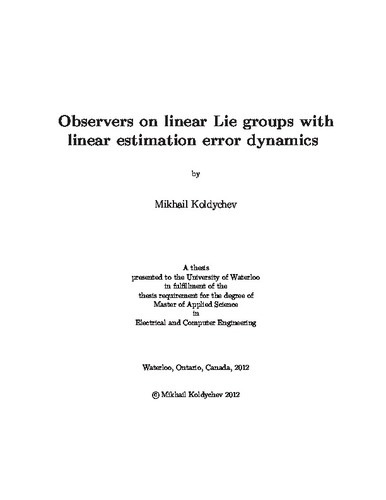| dc.contributor.author | Koldychev, Mikhail | |
| dc.date.accessioned | 2012-09-20 16:38:32 (GMT) | |
| dc.date.available | 2012-09-20 16:38:32 (GMT) | |
| dc.date.issued | 2012-09-20T16:38:32Z | |
| dc.date.submitted | 2012 | |
| dc.identifier.uri | http://hdl.handle.net/10012/7001 | |
| dc.description.abstract | A major motivation for Lie group observers is their application as sensor fusion algorithms for an inertial measurement unit which can be used to estimate the orientation of a rigid-body. In the first part of this thesis we propose several types of nonlinear, deterministic, locally exponentially convergent, state observers for systems with all, or part, of their states evolving on the general linear Lie group of invertible matrices. Our proposed Lie group observer with full-state measurement is applicable to left-invariant systems on linear Lie groups and yields linear estimation error dynamics. We also propose a way to extend our full-state observer, to build observers with partial-state measurement, i.e., only a proper subset of the states are available for measurement. Our proposed Lie group observer with partial-state measurement is applicable when the measured states are evolving on a Lie group and the rest of the states are evolving on the Lie algebra of this Lie group. We illustrate our observer designs on various examples, including rigid-body orientation estimation and dynamic homography estimation.
In the second part of this thesis we propose a nonlinear, deterministic state observer, for systems that evolve on real, finite-dimensional vector spaces. This observer uses the property of high-gain observers, that they are approximate differentiators of the output signal of a plant. Our new observer is called a composite high-gain observer because it consists of a chain of two or more sub-observers. The first sub-observer in the chain differentiates the output of the plant. The second sub-observer in the chain differentiates a certain function of the states of the first sub-observer. Effectiveness of the composite observer is demonstrated via simulation. | en |
| dc.language.iso | en | en |
| dc.publisher | University of Waterloo | en |
| dc.subject | observer | en |
| dc.subject | lie group | en |
| dc.subject | high-gain observer | en |
| dc.subject | inertial measurement | en |
| dc.subject | attitude estimation | en |
| dc.subject | linear error dynamics | en |
| dc.title | Observers on linear Lie groups with linear estimation error dynamics | en |
| dc.type | Master Thesis | en |
| dc.pending | false | en |
| dc.subject.program | Electrical and Computer Engineering | en |
| uws-etd.degree.department | Electrical and Computer Engineering | en |
| uws-etd.degree | Master of Applied Science | en |
| uws.typeOfResource | Text | en |
| uws.peerReviewStatus | Unreviewed | en |
| uws.scholarLevel | Graduate | en |

